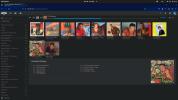AlfieFroud
Member
- Joined
- Sep 4, 2020
- Messages
- 70
- Likes
- 8
I’m on the hunt for a playback streaming device or software that aligns with my specific needs, and I could use your expertise in finding the right fit.
Here are my requirements:
1. Open Source: I’m looking for a solution that is open source, ensuring transparency and flexibility.
2. Secure Protocols: It should not rely on insecure protocols like UPnP, as security is a priority.
3. Linux Compatibility: My music is stored on a Linux server, so I need the streaming device or software to either run on the server and stream to a separate endpoint or run on the output device and access music from the server.
4. Remote Control: I require the ability to control the playback remotely. Compatibility with both Android devices and Linux on a laptop is crucial.
If you have any recommendations or suggestions that match these criteria, I would greatly appreciate your insights. Thank you in advance for your help!
Here are my requirements:
1. Open Source: I’m looking for a solution that is open source, ensuring transparency and flexibility.
2. Secure Protocols: It should not rely on insecure protocols like UPnP, as security is a priority.
3. Linux Compatibility: My music is stored on a Linux server, so I need the streaming device or software to either run on the server and stream to a separate endpoint or run on the output device and access music from the server.
4. Remote Control: I require the ability to control the playback remotely. Compatibility with both Android devices and Linux on a laptop is crucial.
If you have any recommendations or suggestions that match these criteria, I would greatly appreciate your insights. Thank you in advance for your help!

